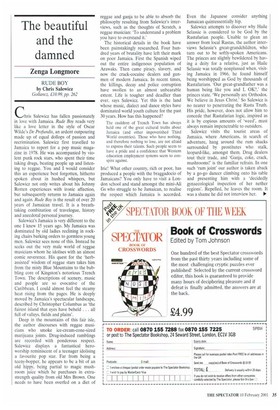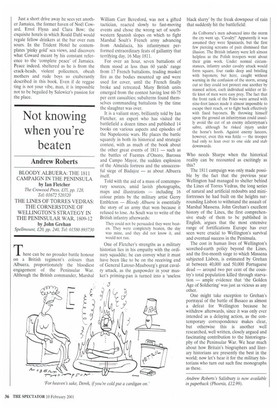The beautiful and the damned
Zenga Longmore
RUDE BOY by Chris Salewicz Goliana, £1099, pp. 262 Chris Salewicz has fallen passionately in love with Jamaica. Rude Boy reads very like a love letter in the style of Oscar Wilde's De Profundis, an ardent outpouring made up of equal dollops of passion and recrimination, Salewicz first travelled to Jamaica to report for a pop music magazine in 1978. He was accompanied by violent punk rock stars, who spent their time taking drugs, beating people up and listening to reggae. You and I would consider this an experience best forgotten, hitherto spoken about in hushed whispers, but Salewicz not only writes about his Johnny Rotten experiences with ironic affection, but subsequently returns to Jamaica again and again. Rude Boy is the result of over 20 years of Jamaican travel. It is a breathtaking combination of travelogue, history and anecdotal personal journey.
Salewicz's Jamaica is very different to the one I knew 15 years ago. My Jamaica was dominated by old ladies reclining in rocking chairs barking orders to gormless young men. Salewicz sees none of this. Instead he seeks out the very male world of reggae musicians whom he idolises with an almost comic reverence. His quest for the 'herbassisted' wisdom of reggae stars takes him from the misty Blue Mountains to the bubbling core of Kingston's notorious Trench Town. The descriptions of scenery, music and people are so evocative of the Caribbean, I could almost feel the steamy heat rising from the pages. He is deeply moved by Jamaica's spectacular landscape, described by Christopher Columbus as 'the fairest island that eyes have beheld . . . all full of valleys, fields and plains'.
Deep in the mountains of this fair isle, the author discourses with reggae musicians who smoke ice-cream-cone-sized marijuana joints. Drug-induced ramblings are recorded with ponderous respect. Salewicz displays a fantastical heroworship reminiscent of a teenager idolising a favourite pop star. Far from being a teeny-hopper, he appears to be a bit of an old hippy, being partial to magic mushroom juice which he purchases in extrastrength quality from old Mrs Brown. One needs to have been overfed on a diet of reggae and ganja to be able to absorb the philosophy resulting from Salewicz's interviews, such as the thoughts of Scratch, a reggae musician: 'To understand a problem you have to overstand it.'
The historical details in the book have been painstakingly researched. Four hundred years of brutality have left their mark on poor Jamaica. First the Spanish wiped out the entire indigenous population of Arawaks. Then came piracy, slavery, and now the crack-cocaine dealers and gunmen of modern Jamaica. In recent times, the killings, decay and police corruption have swollen to an almost unbearable extent. Life is tougher and deadlier than ever, says Salewicz. Yet this is the land whose music, dialect and dance styles have dominated world youth culture for the past 30 years. How has this happened?
The cauldron of Trench Town has always held one of the great cultural truths about Jamaica (and other impoverished Third World countries). Those who have nothing, and therefore nothing to lose, are not afraid to express their talents. Such people seem to have a pride and a confidence that Western education employment systems seem to conspire against.
hie! What other country, rich or poor, has produced a people with the braggadocio of Jamaicans? You only have to visit a London school and stand amongst the mini-Ali Gs who struggle to be Jamaican, to realise the respect which Jamaica is accorded. Even the Japanese consider anything Jamaican quintessentially hip.
Salewicz attempts to discover why Haile Selassie is considered to be God by the Rastafarian people. Unable to glean an answer from local Rastas, the author interviews Selassie's great-grandchildren, who turn out to be softly-spoken Americans. The princes are slightly bewildered by having a deity for a relative, just as Haile Selassie was totally nonplussed when, visiting Jamaica in 1966, he found himself being worshipped as God by thousands of Rastafarians. 'Our great-grandfather was a human being like you and I, OK?,' the princes state. 'We personally are Orthodox. We believe in Jesus Christ.' So Salewicz is no nearer to penetrating the Rasta Truth. His pride, however, does not allow him to concede that Rastafarian logic, inspired as it is by copious amounts of 'weed', must always remain impenetrable to outsiders.
Salewicz visits the tourist areas of Jamaica, where Americans, in search of adventure, hang around the rum shacks surrounded by prostitutes who stalk, leopard-like, amongst them. Drug dealers tout their trade, and `Ganja, coke, crack, mushrooms!' is the familiar refrain. In one such 'rum joint' our author is taken aback by a go-go dancer climbing onto his table and presenting him with a 'decidedly gynaecological inspection of her nether regions'. Repelled, he leaves the room. It was a shame he did not interview her. ■ Just a short drive away he sees yet another Jamaica, the former haven of Noel Coward, Errol Flynn and Clara Bow; the exquisite hotels in which Roald Dahl would regale fellow drinkers at the bar over rum sours. In the Trident Hotel he contemplates 'pinky gold' sea views, and discovers what Coward meant by his constant reference to the 'complete peace' of Jamaica. Peace indeed, sheltered as he is from the crack-heads, violent policemen, obeah mothers and rude boys so exuberantly described in this book. Even if de reggae ting is not your vibe, man, it is impossible not to be beguiled by Salewicz's passion for the place.



































































 Previous page
Previous page